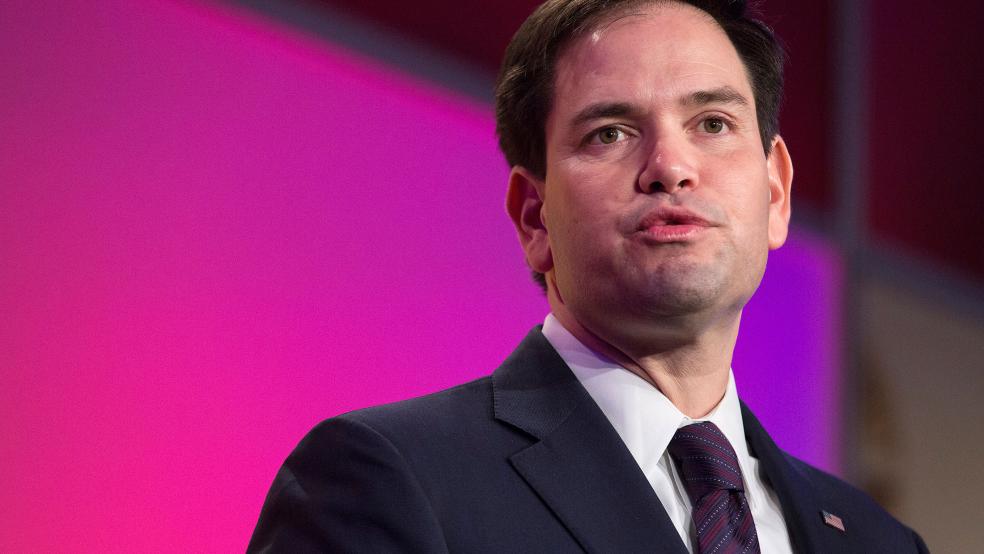Since U.S. stock markets first plunged a week ago as part of a global sell-off tied to China’s troubled economy, Republican presidential candidates have been tripping over one another trying to one-up frontrunner Donald Trump’s attacks on China.
Trump, the real estate tycoon who is soaring in the polls, blasted China’s aggressive international financial strategies, including its devaluation of the Yuan, and repeatedly warned that “China’s taking our jobs, they’re taking our money – they’ll bring us down.”
Related: Walker Jumps on Trump’s Anti-China Bandwagon
Wisconsin Gov. Scott Walker, with his presidential bid trapped in a dangerous spiral and eager to stir up some voter interest, demanded that President Obama cancel Chinese President Xi Jinping’s state visit to the White House next week to protest Beijing’s policies and the hacking of U.S. government computer systems.
“Why should we be giving one of our highest things a president can do – and that is a state dinner for Xi Jinping, the head of China – at a time when all these problems are pending out there?” Walker said.
New Jersey Governor Chris Christie, another struggling GOP presidential candidate, blamed the stock market crash on Obama for racking up too much national debt over the past seven years – debt that is largely held by Chinese and Japanese investors.
“What’s happened is, because this president has run up more debt than any president in American history, that debt has been given to us in large measure by the Chinese,” Christie told Fox News last week, arguing that the economies of the U.S. and China are dangerously linked because of this debtor-creditor relationship.
Related: Why China’s Economy May Be In Better Shape Than We Think
Now comes Sen. Marco Rubio of Florida, yet another GOP candidate struggling to regain altitude in a crowded presidential field, with his own critique and remedy for a troubled U.S.-China relationship.
“President Obama has continued to appease China’s leaders despite their mounting aggression,” Rubio wrote in an op-ed in The Wall Street Journal published Thursday, spelling out in detail his indictment of the administration’s policies and offering a new “three-point plan” for dramatically altering the relationship.
In addition to his “insufficient responses to economic and national security concerns,” the Republican senator wrote, Obama has “ignored” the Chinese government’s mass arrests of human rights advocates, the oppression of religious minorities, the tight controls on citizens’ access to the Internet and detention of political dissidents.
“He has hoped that being more friendly with China will make it more responsible,” Rubio wrote. “It hasn’t worked.”
Related: Market Rebounds, GDP Surges: Sweet for Dems, Tricky for Fed
Rubio disagrees with Walker that the president should call off his meeting with President Xi at this late date. Instead, he would downgrade it from a state visit to a “working visit” and speak bluntly to the Chinese leader in hopes of achieving some meaningful progress. How or why Obama would want to humiliate Xi with a last-minute downgrading of the official visit is anyone’s guess.
While Obama and his advisers will address many of the most sensitive international economic issues and tensions during the visit, they reportedly have sought to downplay the impact of the currency devaluation on the upcoming summit, according to The Washington Post.
Administration officials say that Obama’s overarching approach to China can withstand areas of conflict.
Rubio asserted that if he is elected president next year, he will approach China “on the basis of strength and example, not weakness and appeasement.” Yet despite a lot of harrumphing, there is little in Rubio’s three-point plan that sets him apart from his GOP rivals or – more importantly – suggests how the freshman senator could extract major reforms from the hidebound and powerful Chinese government.
Rubio said he would begin by restoring America’s “strategic advantage” in the Pacific by matching China’s steady increase in defense spending – including a 10 percent increase this year alone. By unleashing U.S. defense spending in the coming years, a popular GOP theme in the current budget battle in Congress, the U.S. would be better able to “neutralize” China’s rapidly growing capabilities in every strategic realm, including air, sea, ground and cyber space, Rubio contends.
Related: Timeline of China's attempts to prevent stock market meltdown
But how a new arms race between the U.S. and China – and all the attendant tensions that would come from challenging the Chinese in international waters and airspace -- would improve our leverage in negotiating better trade and economic terms is not fully explained.
Moreover, Rubio’s call for lifting caps on U.S. defense spending without proposing offsetting cuts or revenue increases will simply add to the deficit and the overall $18 trillion national debt – forcing the Treasury to turn to China for even more loans.
The rest of Rubio’s proposals are largely Republican boilerplate, insisting on “free markets and free trade” in dealing with the Chinese and demanding human rights reforms, including the release of political prisoners.
“Americans must elect a president willing to lead with strength and by example,” Rubio concluded. “A strong America – militarily, economically and morally – is the only path to lasting peace and partnership between the U.S. and China.”





